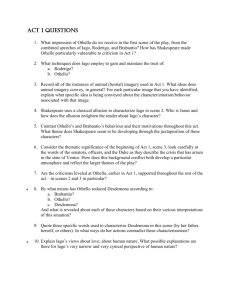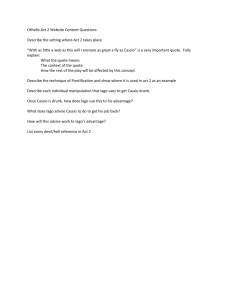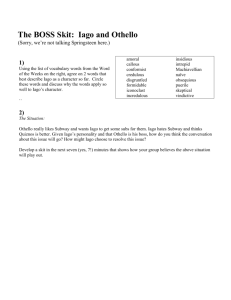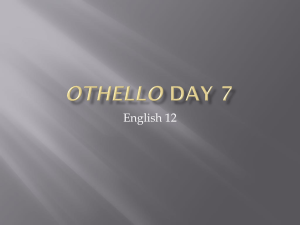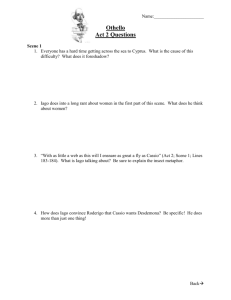Othello Act I Questions
advertisement
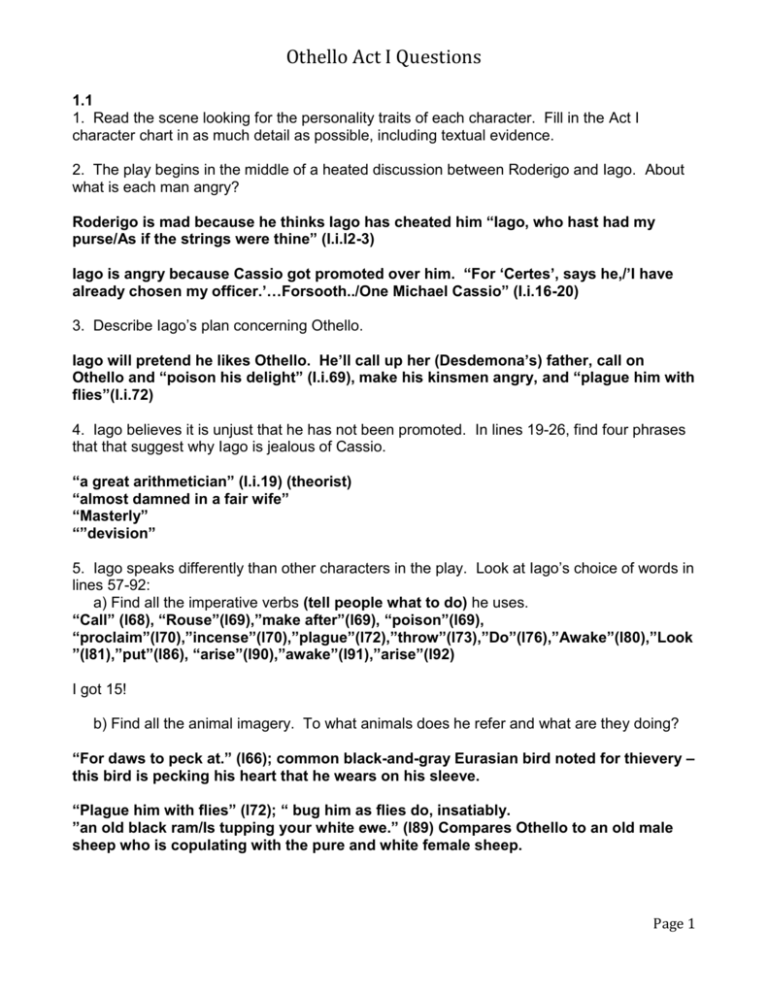
Othello Act I Questions 1.1 1. Read the scene looking for the personality traits of each character. Fill in the Act I character chart in as much detail as possible, including textual evidence. 2. The play begins in the middle of a heated discussion between Roderigo and Iago. About what is each man angry? Roderigo is mad because he thinks Iago has cheated him “Iago, who hast had my purse/As if the strings were thine” (I.i.l2-3) Iago is angry because Cassio got promoted over him. “For ‘Certes’, says he,/’I have already chosen my officer.’…Forsooth../One Michael Cassio” (I.i.16-20) 3. Describe Iago’s plan concerning Othello. Iago will pretend he likes Othello. He’ll call up her (Desdemona’s) father, call on Othello and “poison his delight” (I.i.69), make his kinsmen angry, and “plague him with flies”(I.i.72) 4. Iago believes it is unjust that he has not been promoted. In lines 19-26, find four phrases that that suggest why Iago is jealous of Cassio. “a great arithmetician” (I.i.19) (theorist) “almost damned in a fair wife” “Masterly” “”devision” 5. Iago speaks differently than other characters in the play. Look at Iago’s choice of words in lines 57-92: a) Find all the imperative verbs (tell people what to do) he uses. “Call” (l68), “Rouse”(l69),”make after”(l69), “poison”(l69), “proclaim”(l70),”incense”(l70),”plague”(l72),”throw”(l73),”Do”(l76),”Awake”(l80),”Look ”(l81),”put”(l86), “arise”(l90),”awake”(l91),”arise”(l92) I got 15! b) Find all the animal imagery. To what animals does he refer and what are they doing? “For daws to peck at.” (l66); common black-and-gray Eurasian bird noted for thievery – this bird is pecking his heart that he wears on his sleeve. “Plague him with flies” (l72); “ bug him as flies do, insatiably. ”an old black ram/Is tupping your white ewe.” (l89) Compares Othello to an old male sheep who is copulating with the pure and white female sheep. Page 1 Othello Act I Questions c) He talks a lot about himself in this passage; find all the first person pronouns. 15 in total: I, my myself. d) What does Shakespeare’s use of language suggest about Iago’s personality and his relationship with other men? He is very arrogant, self serving, and is used to ordering people around. I can’t imagine people liking him nor would he feel that anyone was at the same level as he. 6. Identify any other animal imagery in this scene. Who uses it and what does it suggest about his personality? All Iago – crude – implies his feeling of superiority he is so superior like man is over the animal kingdom “Master’s ass” (47) “you'll have your daughter covered with a Barbary/ horse; you'll have your nephews neigh to you; you'll have/ coursers for cousins and jennets for germans" (1.1.111-4) The Barbary coast was famous for horse-breeding. 'Coursers' refers either to powerful horses used in battle or to racehorses. A 'jennet' is a small Spanish horse. The word 'Germans' means close blood relatives. "your daughter and the Moor/ are now making the beast with two backs" (1.1.115-6) 7. a) Of what do Iago and Roderigo convince Brabantio? That his daughter is having sexual relations with Othello and that his offspring will be beasts. How do they accomplish this? Basically by saying that they’ll go to jail if they are wrong. “”Let loose on me the justice of the state/For this deluding you.”(I.i.138-139) b) Why does this make Brabantio so angry? He has already dreamt that this has happened. 8. Both Desdemona and Juliet (from last year’s Romeo and Juliet) make choices of which their parents wouldn’t approve. How does Roderigo’s description of Desdemona’s escape (1.1.119-136) compare with Juliet’s rebellious behaviour? Sneaks out at night and without her parent’s permission, into the arms of someone who her father would not approve. 9. Why does Iago leave before Brabantio descends? He says it will not “be produced, as if I stay I shall,/Agaist the Moor…this may gall him with some check”(1.i.l146-147) Meaning he doesn’t want to be seen by Othello – it would hurt his plan. 10. On page 228, read the passage “Verse and Prose”. Which character sometimes speaks in prose in this scene? Iago – l109-l113; l115-116; Page 2


